- California Assembly OKs highest minimum wage in nation
- S. Korea unveils first graphic cigarette warnings
- US joins with South Korea, Japan in bid to deter North Korea
- LPGA golfer Chun In-gee finally back in action
- S. Korea won’t be top seed in final World Cup qualification round
- US men’s soccer misses 2nd straight Olympics
- US back on track in qualifying with 4-0 win over Guatemala
- High-intensity workout injuries spawn cottage industry
- CDC expands range of Zika mosquitoes into parts of Northeast
- Who knew? ‘The Walking Dead’ is helping families connect
Korea to top Japan in account surplus for first time

Korea has recorded a surplus for 20 consecutive months through September, and exports in October surpassed $50 billion for the first time ever. (Korea Times file)
By Kim Rahn
Korea’s current account surplus is likely to exceed that of Japan for the first time ever this year, backed by the country’s strong automobile and IT exports and increased energy imports by the latter.
The Bank of Korea (BOK) said Sunday that Korea posted a $42.2 billion current account surplus in the first eight months of the year. During the same period, Japan posted a surplus of $41.5 billion, according to its Ministry of Finance. “For the first time ever, Korea is expected to top Japan in terms of current account surplus,” a BOK official said.
When taking the remaining months’ outcome into account, this year’s total surplus is also likely to exceed that of Japan, as the BOK estimates Korea’s total at $63 billion while the Japan Research Institute estimates Japan’s total at $60.1 billion.
This is a huge change from past decades. In the early and mid-1990s when Korea experienced current account deficits, Japan had more than $100 billion in surplus. Japan’s surplus in the early 2000s was almost 10-fold that of Korea’s as well, and in 2008 right after the global financial crisis, Japan’s surplus was $159.3 billion, 50 times larger than Korea’s $3.2 billion. However, Japan’s current account surplus almost halved from $203 billion in 2010 to $119 billion in 2011 and dropped further to $60.4 billion last year.
This is partly because the country has had to increase its import of energy resources following the nuclear power plant shutdown in Fukushima, after a massive earthquake and tsunami in 2011. Another cause is the poor performance of Japanese electronics companies which used to dominate the global market. “The decrease of Japan’s current account surplus since the end of last year is also attributable to the weak yen following the government’s monetary easing policy, as the sum converted into dollars is smaller than before,” the official said.
For the remaining months of the year, Japan is forecast to record a weak current account balance because it will have to increase its energy imports over the winter. In contrast, Korea’s current account surplus has been moving upward from $26 billion in 2011 to $43.1 billion last year. The increase was mainly backed by rising overseas demand of key export products, including cell phones and cars.
The country has recorded a surplus for 20 consecutive months through September, and exports in October surpassed $50 billion for the first time ever. Despite the Korean won’s appreciation, many investment banks expect the current account surplus to continue for an extended period of time. Nomura raised its forecast for the surplus this year from $60 billion to $66 billion. “Korea’s current account balance continues to post a sizable surplus, mainly due to relatively weak imports compared to exports and an improvement in the terms of trade, which has offset the negative impact of real effective appreciation of the won,” Nomura economist Kwon Young-sun said.














![넷플릭스 2025년 라인업 공개 [넷플릭스 제공. 재판매 및 DB 금지]](http://www.koreatimesus.com/wp-content/uploads/2025/04/20250415135202671-copy-120x134.jpg)
